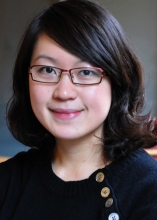BME Lecture Series: Sindy Tang, Stanford University

Assistant Professor
Department of Mechanical Engineering
Abstract: This talk examines the collective behavior of drops in a concentrated emulsion by tracking the dynamics and fate of individual drops within the emulsion. At the fast flow limit, we show that droplet breakup within the emulsion is stochastic. This contrasts the deterministic breakup in classical single-drop studies. We further demonstrate that the breakup probability is described by dimensionless numbers including the capillary number and confinement factor, and the stochasticity originates from the time-varying packing configuration of the drops. To mitigate breakup, we design novel amphiphilic nanoparticles and show they are more effective than surfactant molecules as droplet stabilizers. Our results represent a new type of collective order not described before and have practical use in on-chip droplet manipulation. From the solid mechanics perspective, the phenomenon directly contrasts the stochasticity of dislocations in microscopic crystals and suggests a new approach to control the mechanical forming of nanocrystals.
Bio: Sindy KY Tang joined the faculty of Stanford University in September 2011 as an assistant professor in the Department of Mechanical Engineering. She received her doctorate from Harvard University in engineering sciences under the supervision of Professor George Whitesides. Her lab at Stanford works on the fundamental understanding of fluid mechanics and mass transport in microfluidic systems and the application of this knowledge toward problems in biology and rapid diagnostics for health and environmental sustainability. The current areas of focus include the hydrodynamics of concentrated emulsions in confinements, interfacial mass transport and self-assembly, and ultrahigh throughput opto-microfluidic systems for biochemical sensing and diagnostics, water and energy sustainability, and single-cell wound healing studies.
Share
Upcoming Events
-
MAE 298 SEMINAR: Europa Clipper Mission Design
-
CBE 298 Seminar: Metal Electrodeposition for Modern Mineral Refining
-
MSE 298 Seminar: Quasi-1D/2D Charge-Density-Wave Materials - From Exotic Physics to Application Prospects
-
EECS Seminar: Steering Diffusion Models for Generative AI, From Multimodal Priors to Test-Time Scaling
-
CBE 298 Seminar: Finding Catalysts of Gut Reactions - The Gut Microbiota in Disease Onset and Treatment
